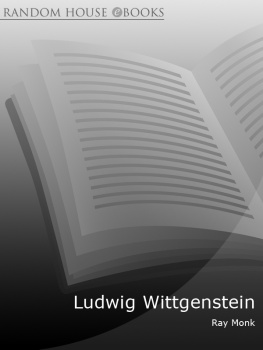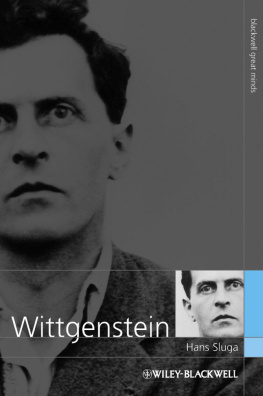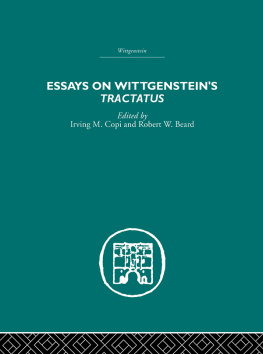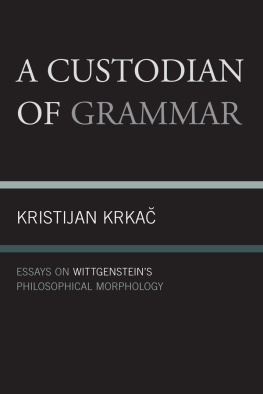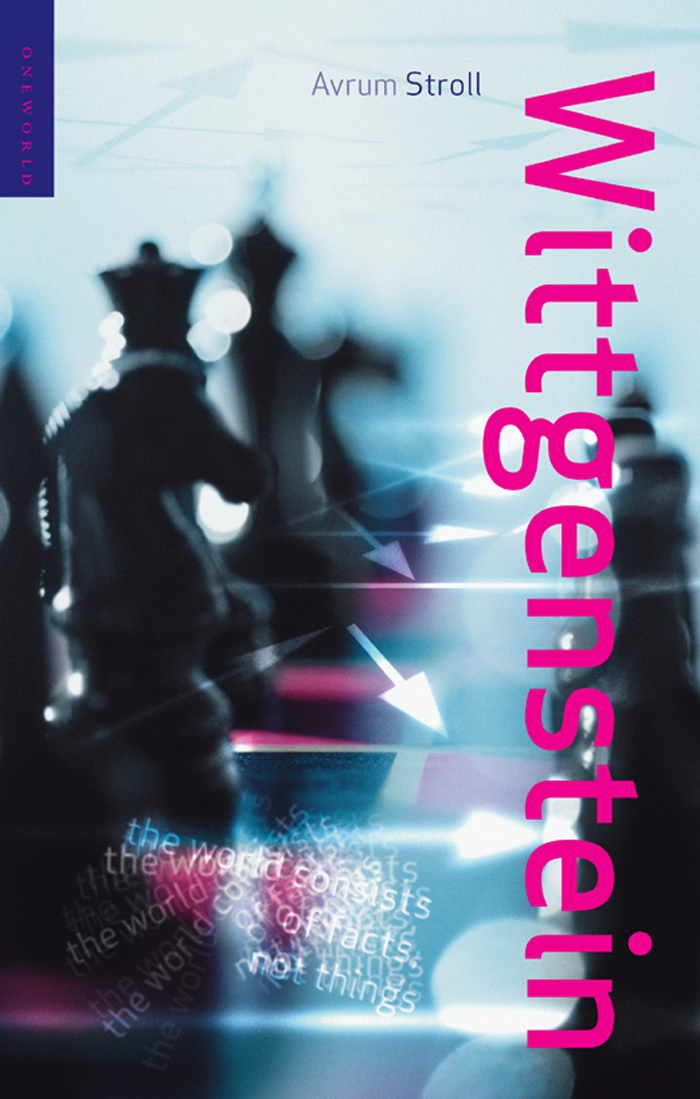Wittgenstein
OTHER TITLES IN THE ONEWORLD PHILOSOPHERS SERIES
Descartes, Harry M. Bracken, ISBN 1851682945
Hobbes, Eugene Heath, ISBN 1851682929
Nietzsche, Robert Wicks, ISBN 1851682910
Sartre, Neil Levy, ISBN 1851682902
Wittgenstein
Avrum Stroll
ONEWORLD PHILOSOPHERS

WITT GENSTEIN
Oneworld Publications
10 Bloomsbury Road
London WC1B 3SR
England
This ebook edition published in 2013
Avrum Stroll 2002
All rights reserved.
Copyright under Berne Convention.
A CIP record for this title is available
from the British Library
ISBN 9781851684861
eISBN 9781780744759
Cover design by the Bridgewater Book Company
Cover image Hulton Archive
Typeset by Saxon Graphics Ltd, Derby, UK
Stay up to date with the latest books,
special offers, and exclusive content from
Oneworld with our monthly newsletter
Sign up on our website
www.oneworld-publications.com
For Mary
Contents
Acknowledgments
Wittgenstein describes his Philosophical Investigations as sketches of landscapes. Given the richness of content of that work, plus its diffuse style, one who writes about Wittgenstein can in no way capture the full range of his thought in any sort of detail. The book that follows is thus also a sketch. So what you will be reading is a sketch of sketches.
Even this vignette would not have been possible without the assistance of many persons who read various versions of the manuscript. I found their comments constructive and helpful. My sincere thanks thus go to Zeno Vendler, Norman Roberson, Pina Pasquantonio, Michael Hersch, Mel Thompson and Daniele Moyal-Sharrock. But above all, I wish to express my deep appreciation to my wife, Mary, who took time away from her own researches into twelfth-century papal politics to scrutinize what I had written. Her comments about organization and style were invaluable. For that, and for other reasons of course, I dedicate this work to her.
Chapter One
The greatest modern philosopher
Wittgensteins originality
The word genius is frequently applied to mathematicians, scientists, artists, and musicians, but rarely to philosophers. However, there is a notable exception: Ludwig Wittgenstein. Echoing others, Bertrand Russell described him as perhaps the most perfect example I have ever known of genius as traditionally conceived, passionate, profound, intense, and dominating. In a memorable phrase Wittgenstein once wrote: Uttering a word is like striking a note on the keyboard of the imagination (Philosophical Investigations, 6). No other twentieth-century philosopher has uttered so many words that struck the keyboard of the imagination. That he was a genius is beyond serious doubt. Because of the originality and depth of his thought, he is widely regarded as the greatest modern philosopher.
Since his death at the age of sixty-two on 29 April 1951, a vast number of articles, monographs, essays, commentaries, and books, have been devoted to his life, personality, and work. Some researchers estimate the number of such items to be more than 7000. Not all of these are technical pieces. There are biographies, plays, a novel, a television drama, and even a video for children in which he is depicted as a computer. Even outside of philosophy he has become a legend. Today his ideas are discussed in anthropology, literature, sociology, psychology, and linguistics. No other twentieth-century philosopher has been the focus of such intense scholarly concentration.
Given this vast outpouring of materials it is sensible to ask: Why do we need another book the one you are now reading on Wittgenstein? There are at least two answers to the question. Both are somewhat lengthy. Here is the first. It deals with the need to update and extend the scope of existing commentaries. During his lifetime, Wittgenstein published only two things: a book the Tractatus Logico-Philosophicus in 1922, and a short essay on logical form in 1929. In the twenty-two remaining years of his life, he continued to write incessantly. After his death his executors discovered an enormous legacy of unpublished writings. The amount of material, most of which is still being edited, is estimated to consist of about ninety-five volumes, some of which are non-philosophical, some of which are differing versions of the same works, but most of which are new. The first document to be issued was Philosophical Investigations, which appeared in 1953. This is generally regarded as Wittgensteins masterpiece. Since the Investigations another twenty or so volumes have been released, some of them only recently. Exegetes are just now beginning to explore these materials. Most existing studies do not deal with these works. They tend to stop with the Investigations. David Pearss The False Prison (1987) and P. M. S. Hackers Wittgensteins Place in Twentieth-Century Analytic Philosophy (1996) exemplify the point. Both are superb books yet they focus entirely on the Tractatus and the Investigations. A need to update and extend the coverage of the existing scholarship is thus mandatory. This is what I will do in this study. It will deal with Wittgensteins latest contributions in a way that no other general work does, and this constitutes one justification for writing it.
The second answer is closely related to the first. It provides a new picture of Wittgensteins intellectual development. Almost all scholars divide Wittgensteins career into two phases. In their view the first is the time span between 1911 and 1922, and the second is the period from 1929 until his death in 1951. The former begins when he came to Cambridge University to study logic with Bertrand Russell and ends with the publication of the Tractatus. That initial stage was interrupted by the outbreak of the First World War in 1914. An Austrian patriot, Wittgenstein immediately left Cambridge and joined the Austrian army. During the war he fought with distinction. In the declining days of the conflict he was captured by the Italians and spent a year in a prison camp near Monte Cassino. During the war he finished writing the Tractatus and while in captivity arranged to send the manuscript to Russell who was eventually instrumental in having it published. Thinking that in this work he had solved all the major problems of philosophy, he spent the next decade as an elementary school teacher in Lower Austria and as a self-proclaimed architect, designing a house in Vienna for his sister (Margarete Stonborough) that has since become a national monument.
The second phase begins when he decided to resume his philosophical career. He returned to Cambridge as a graduate student in 1929. Intellectually, this is his most creative period. Much, though not all, of it was spent in England. It was during this second phase that his philosophical ideas changed radically, being based on a new method he invented for dealing with philosophical problems (see ). The commentators generally describe this segment as the later philosophy of Wittgenstein. But after Part I of the Investigations was completed (probably in 1945), Wittgensteins philosophical explorations continued unabated and reached new heights.


